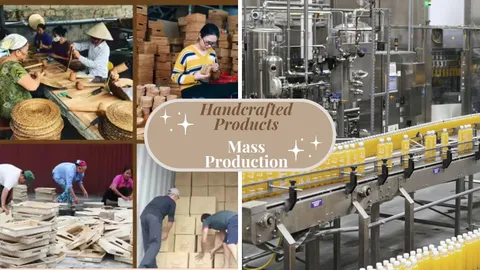The Benefits of Handcrafted Products vs. Mass-Produced Items

In today’s consumer market, the choice between handcrafted products and mass-produced items is more relevant than ever. While mass-produced items may offer convenience and affordability, handcrafted products bring a unique set of benefits that often make them the superior choice. Let’s delve into the key differences, focusing on quality, durability, and sustainability.
Quality
Handcrafted Products: One of the most significant advantages of handcrafted products is the attention to detail and the level of craftsmanship involved. Each piece is carefully made by skilled artisans who take pride in their work, ensuring that every product is unique and meets high standards of quality. This meticulous process often results in superior finishes, intricate designs, and a personal touch that mass-produced items lack.
Mass-Produced Items: Mass production relies on automated processes and machinery to produce large quantities of products quickly. While this method is efficient, it often sacrifices quality for quantity. The uniformity and standardization in mass production can lead to products that lack individuality and may not undergo the same rigorous quality checks as handcrafted items.
Durability
Handcrafted Products: Handcrafted items are typically built to last. Artisans use high-quality materials and traditional techniques that have been refined over generations. This approach not only ensures the product’s durability but also its ability to age gracefully. Handcrafted items are often heirloom pieces that can be passed down through generations, retaining their value and beauty over time.
Mass-Produced Items: The focus on cost-efficiency in mass production often means using cheaper materials and shortcuts in the manufacturing process. This can result in products that are less durable and more prone to wear and tear. Mass-produced items may need to be replaced more frequently, leading to higher long-term costs and increased waste.
Sustainability
Handcrafted Products: Sustainability is a core advantage of handcrafted products. Artisans often source materials locally and use eco-friendly practices that minimize environmental impact. The slower production process also means less energy consumption and lower carbon emissions. Moreover, the longevity of handcrafted items contributes to a reduction in waste, aligning with sustainable living principles.
Mass-Produced Items: The environmental footprint of mass-produced items is typically much larger. The reliance on large-scale factories, long supply chains, and mass transportation results in higher energy consumption and carbon emissions. Additionally, the use of non-renewable materials and the shorter lifespan of these products contribute to greater environmental degradation and waste accumulation.
Uniqueness and Personal Connection
Handcrafted Products: Each handcrafted product tells a story. The artisan’s skill, creativity, and cultural heritage are embedded in every piece, making it one-of-a-kind. Customers often feel a personal connection to handcrafted items, appreciating the time and effort that went into creating something unique.
Mass-Produced Items: Mass-produced items are designed for uniformity and efficiency, often lacking the personal touch and uniqueness of handcrafted products. While they may be functional and widely available, they seldom offer the same emotional connection or sense of individuality.
Conclusion
Choosing between handcrafted products and mass-produced items comes down to what you value most as a consumer. If you prioritize quality, durability, sustainability, and uniqueness, handcrafted products are the clear winner. They offer a personal touch and a connection to the artisan’s craft that mass-produced items simply cannot match.
At VangLung Rattan, we take pride in our handcrafted products, which reflect our commitment to quality and sustainability. Each piece is a testament to the skill and dedication of our artisans, designed to bring beauty and longevity to your home. By choosing handcrafted, you not only invest in a superior product but also support sustainable practices and the preservation of traditional craftsmanship.
